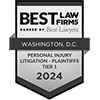Preventing the nightmare of nursing home resident elopement
In Virginia and across the country, a debate is raging over how to keep our seniors safe in long term care facilities. Reports of abuse and neglect in nursing homes, assisted living facilities, group homes and other similar care centers for elderly or disabled people are in the news all too often.
The danger of elopement
According to the Briggs Corporation, patient elopement occurred in 10 percent of lawsuits against nursing homes. Briggs defines elopement as “when a dependent resident in a licensed facility leaves that facility without staff observation or knowledge.”
Obviously, a person needing a residential care center is vulnerable in some way. He or she may have dementia, memory loss, confusion, a developmental disability, physical disability, poor health or frailty. Imagine the terror that strikes a family member who receives a call from the care facility that a search is underway for a missing family member who is vulnerable in the community to the elements, terrain, water, traffic, animals, violence, exploitation and abuse.
Nursing homes and similar facilities are highly regulated under federal, state and local law, especially in the area of patient safety. Management and staff must implement these laws as well as keep current on accepted and cutting-edge practices and technology to prevent elopement.
Consultants and experts are available to advise long term care facilities about elopement prevention, how to train staff and the use of technology and equipment to assist in the endeavor.
Some of the ways for a facility to fulfill its duty to keep its patients safe from elopement include:
- Assessment: assess potential residents for elopement risk and only accept them if the facility can safely care for them; after admission, assess for specific elopement dangers initially and create a preventative care plan and specific interventions, with regular review; all staff dealing with such a patient must be trained in elopement prevention and familiar with each at-risk patient’s behaviors and prevention plan.
- Monitoring: have enough staff to safely monitor patients; train staff to recognize behavior indicative of elopement risk; use alarms, locks, cameras, security personnel and safety bracelets as appropriate.
- Equipment: keep all equipment related to elopement prevention maintained, including alarms when batteries become low; keep abreast of new safety equipment and purchase as needed; train all staff regularly on equipment use.
- Response planning: create an emergency elopement plan to implement when a resident elopes that includes an immediate search, and notification of authorities and family.
- Reporting and prevention: report elopement incidents to authorities as required by law; document what led to the incident and how it was resolved for review by management or quality control personnel.
Seek legal counsel
If your loved one eloped from a nursing home, assisted living facility or other care center, hopefully he or she was found safe and unharmed. But if that was not the case and your family member was injured, abused or attacked; became ill; had a negative emotional or mental reaction to the experience; or was killed, speak to an experienced elder care attorney with specific nursing home neglect experience.
A knowledgeable lawyer can launch an investigation on behalf of your loved one to understand the circumstances that led to the incident and determine whether negligent, reckless or illegal acts contributed, in which case a personal injury, wrongful death or other type of lawsuit for money damages may be appropriate. Legal counsel can assess the situation to identify all potentially responsible parties like individual staff members, medical personnel, the company or organization that owns the facility, insurance companies and more.
















